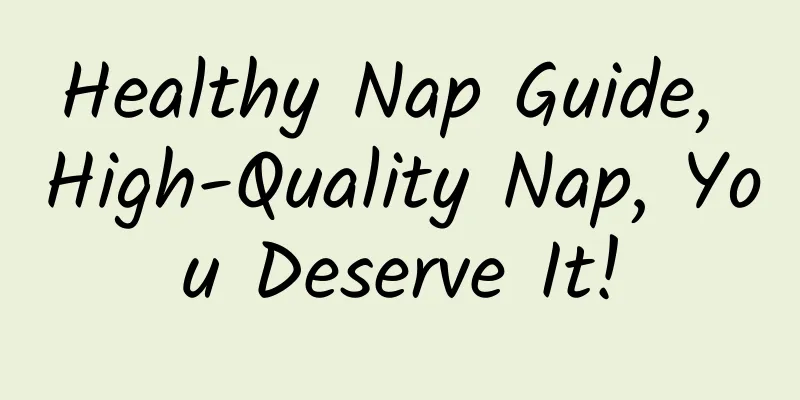Healthy Nap Guide, High-Quality Nap, You Deserve It!

|
As the saying goes, "If you don't take a nap at noon, you will collapse in the afternoon." For many students and office workers, taking a nap can recharge the body and brain. But this nap is also very particular. If you take a nap right, you will be energetic, but if you take a nap wrong, you will feel groggy, which is not worth the loss. Image source: Baidu Gallery First of all, what are the benefits of taking a nap? 1. Effectively "nourish" the eyes During the nap, the tear glands will secrete tears, which can effectively moisturize the eyes that have been working for a long time in the morning. At the same time, the eye muscles are also relaxed to a certain extent, which can play a role in protecting vision. 2. Eliminate fatigue Many people have the trouble of feeling tired after lunch. A nap is like a "blood-replenishing pack" for the body, especially for many young people who are busy with work and like to stay up late, go to bed late and get up early, and feel drowsy during the day. They really need a nap to replenish sleep and restore energy. 3. Adjust your mood and relieve stress After a nap, people will be less nervous, the stress relief effect is very obvious, and their mood will be much better. 4. Improve brain blood supply and enhance immunity Many people don’t sleep well at night, so taking a nap at noon can not only improve their spirits, but also improve insufficient blood supply to the brain. A nap can also effectively stimulate lymphocytes in the body and enhance the activity of immune cells. 5. Repair brain cells and improve memory During a nap, the brain enters a state of relaxation, and brain cells will use this time to repair themselves. The sleep process will organize fragmented memories, transforming information in the brain from short-term memory to long-term memory, and effectively improving people's memory. How long is a good nap? The longer the nap is, the better it is. For most people, the most suitable nap time is between 13:00 and 15:00, and the duration is controlled within 20 to 30 minutes. Sleeping this way will not only make you feel refreshed when you wake up, but also significantly improve your brain's sensitivity. If time is limited, sleeping for only 5 to 10 minutes can also relieve fatigue and help you concentrate to a certain extent. On the contrary, if the nap time exceeds 30 minutes, the brain will enter the "deep sleep stage". If the sleep cycle is interrupted at this time and you are forced to wake yourself up, the brain's biological clock will be thrown into chaos, resulting in "sleep inertia", which will make you more tired and affect your mental state. To sleep better, avoid these bad habits: 1. Go to sleep immediately after eating After a meal, a lot of blood will flow to the stomach. Falling asleep right away will cause insufficient blood supply to the brain. After waking up, you will feel dizzy and unable to get a perfect sleep. It may also cause indigestion and be bad for the stomach. Recommendation: It is best to exercise for at least 5 to 10 minutes after lunch before preparing for a nap, such as standing for a while or walking slowly. 2. Often sleep on your stomach Sleeping on your stomach will not only affect blood circulation and nerve conduction, causing numbness and tingling in the arms and hands, but will also put pressure on the eyeballs, affecting eye health. In severe cases, it will also damage the spine, affecting posture and spinal health. Recommendation: Try to sleep lying down. If this is not possible, you can prepare a nap pillow. Try not to put your head directly on your arms. Image source: Baidu Gallery 3. Direct the air conditioner towards yourself After falling asleep, a person's muscles will become relaxed, capillaries will dilate, and the body's resistance will also decrease. If a fan or air conditioner blows directly at the body, it can easily cause colds, headaches, joint and muscle pain, etc. Suggestion: You can direct the wind toward the sky or to an uninhabited area. The following groups of people need to choose whether to take a nap based on their own circumstances: 1. People who are prone to insomnia People who suffer from insomnia at night should not take naps. People's sleepiness needs to accumulate. Taking naps during the day will not help people with insomnia fall asleep, and may even aggravate their insomnia. 2. Overweight people For people whose weight exceeds the standard weight by 20% and who have the habit of taking naps, it is recommended that they reduce high-calorie, high-fat meals for lunch, otherwise they will easily accumulate fat and aggravate obesity. 3. People with low blood pressure During a nap, the human circulatory system is in a low-power state, and people with low blood pressure have slower blood flow, which is more detrimental to their condition. It is recommended not to take a nap directly after a meal. A short nap after a simple activity will promote blood circulation. If conditions permit, it is recommended that you take a nap as much as possible. Although it is only a short nap of a dozen minutes, it can repair the body and brain very well. |
<<: Infonetics: Global telecom wireless equipment market forecast to reach $3.9 billion in 2017
>>: Nielsen: 57% of live broadcast viewership comes from Twitter users
Recommend
5 tips for growing great hair
Nowadays, people pay more and more attention to t...
What are the harms of cervical polyps to the body
Many women will find polyps on their cervix durin...
What can I eat during my period without getting fat?
That is not the case. During menstruation, women&...
Is ectopic pregnancy abortion dangerous?
Modern women face many physiological and reproduc...
My stomach hurts on the fourth day of medical abortion
Medical abortion usually requires three days of m...
What are those white spots at the roots of your hair? Will you become bald if you don't have them?
One minute, Doctor. Postures keep rising - End of...
How to remove a woman's beard
Long beard is a symbol of masculinity and represe...
Can I open the windows after a miscarriage?
With the current social development level and adv...
The protagonist of "The World" died of stomach cancer. What habits are harmful to the stomach? What should we do to prevent stomach cancer?
The protagonist of the hit TV series "The Wo...
Xiaomi: The cumulative payment amount of Xiaomi Double 11 across all channels will exceed 31.9 billion in 2024
The annual Double 11 e-commerce festival has come...
Can I eat peaches after an abortion?
Diet after abortion is very important. Only balan...
Can the 35-week fetal malposition be turned around?
Pregnant women need to have regular prenatal chec...
What color is best for sun protection clothing in summer? It is best to choose light colors
If people are exposed to the sun for a short peri...
What causes pain in the vagina
If some women do not pay enough attention in thei...
How do models lose weight and keep in shape?
Models all have very beautiful bodies. Most of th...









